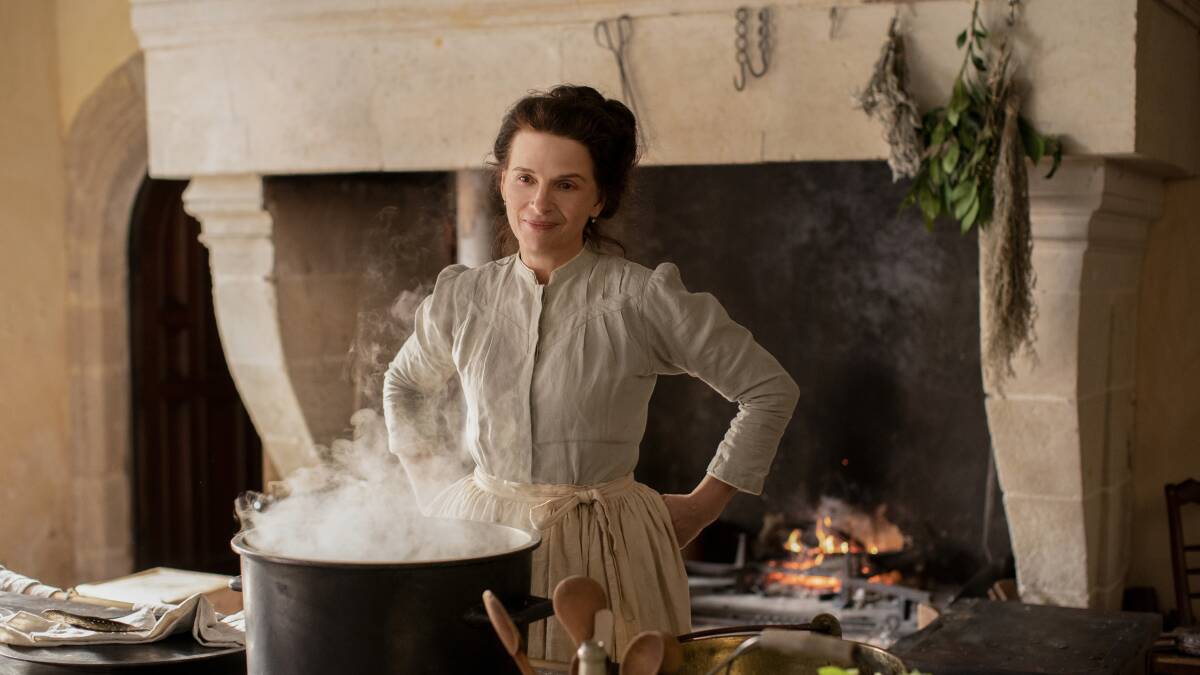The Taste of Things
(PG, 145 minutes)
5 stars
It's a waltz around the kitchen as cooks prepare banquets to while away the hours in this quintessentially French movie that has won a best director award at Cannes. The experience is like stepping into the frame to join them as they prepare and plate up for the lucky guests sipping aperitifs in the dining room nearby.
The film's French title, La Passion de Dodin Bouffant, has replaced its original Le Pot-au-Feu, which was a more explicit reference to the kind of passion we are talking about here. There is a romance, but we are talking passion for food. The character of Monsieur Dodin (Benoit Magimel) is apparently loosely based on a 19th-century French epicure, Jean Brillat-Savarin.

It takes us back to a time when French food and wine were king, but it transports us to a chateau near the Loire, where it would be bliss to be right now during the northern spring. The lush images and sensual mood were a powerful reminder of the first feature film from its Vietnamese-born French director Anh Hung Tran, The Scent of Green Papaya.
Sunlight streams through the kitchen door as a meal of many courses evolves. There's consommé, a splendid vol-au-vent, loin of veal with braised lettuce, turbot and potatoes laced with hollandaise sauce, all brought to a dramatic climax with a baked Alaska. A dessert so delicious that apprentice chef Pauline (Bonnie Chagneau-Ravoire) all but cries. Her wide eyes grow even wider as Eugenie explains how beaten egg whites keep the ice cream within it frozen.
After a glimpse of the manor's vast vegie patch as Eugenie (Juliette Binoche) selects her ingredients, we are whisked indoors to watch the drama unfold. It's nothing like observing a contemporary kitchen where events take place at kinetic pace. After watching movies like Dinner Rush or The Bear series on TV, you feel wired. After The Taste of Things, it feels like you have had a languid interlude away from the world, nestled in the French countryside and free of concern about who is to do all that washing up.
The choreography of the kitchen is something to behold. Everyone, including the master of the manor, Dodin, who joins in the food prep, always knows exactly what to do next. Cinematographer Jonathan Ricquebourg had his Steadicam operator weave in and out and around the activity, combining this fluid movement with some sharper shots homing in on the action. After a mere dreamy half-hour at the beginning watching the dishes take shape, it soon becomes mesmerising.
And so tactile. Quantities are doled out by hand with casual inattention. As though these amounts are recognised intuitively, known by heart and measured by hand, before ingredients are tipped into the waiting utensils on the stove. The process of cooking establishes a sensual mood long before the scenes where Dodin knocks gently on Eugenie's bedroom door. Or makes another impassioned proposal for her hand in marriage, by inventing an exquisite new dessert of preserved pear wrapped in fine pastry for her delectation, and a ring for her consideration.
The pair have been an item for 20 years, yet she is happy to remain his lover. As his wife, she says, she would be obliged to leave her door always open. It is tantalising to read this as her fierce independence. After all, she is widely acknowledged as the creative spirit behind Dodin's success as a gourmet, and Binoche herself has often been cast, or accepted roles, as an independent woman. But her resistance to the lovely man who adores her may also be the result of her mystery illness, bringing severe pain and fainting spells.
It is interesting to know that the actor Binoche plays opposite was once her partner and they share a daughter from that time. That bond seems to translate to the screen.
This is more than just a film for foodies. It's special. With its emphasis on traditional dishes and traditional roles, it would be easy to say that this delectable, sumptuous film is overly nostalgic, out of step with contemporary sensibilities. I would say it reflects the time in which it is set, and its focus is on the few timeless things that really matter, including the passion that goes into preparing food for those we love.

